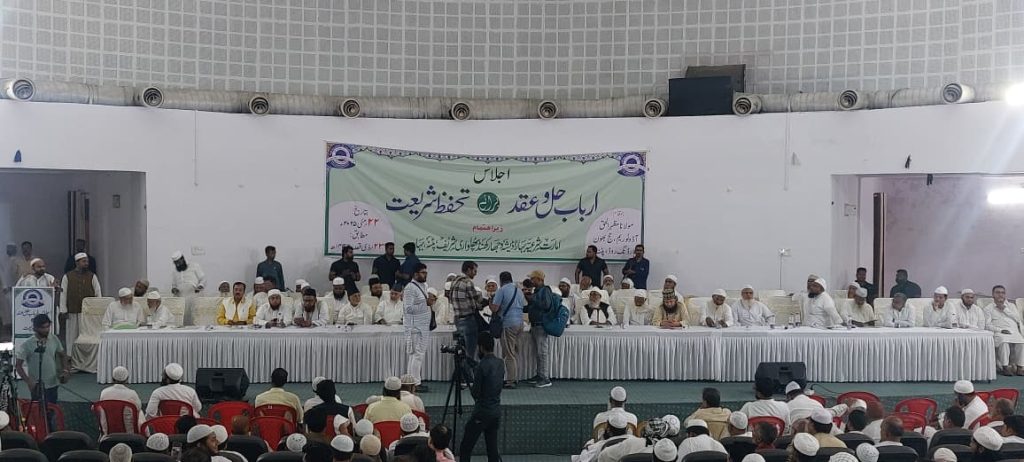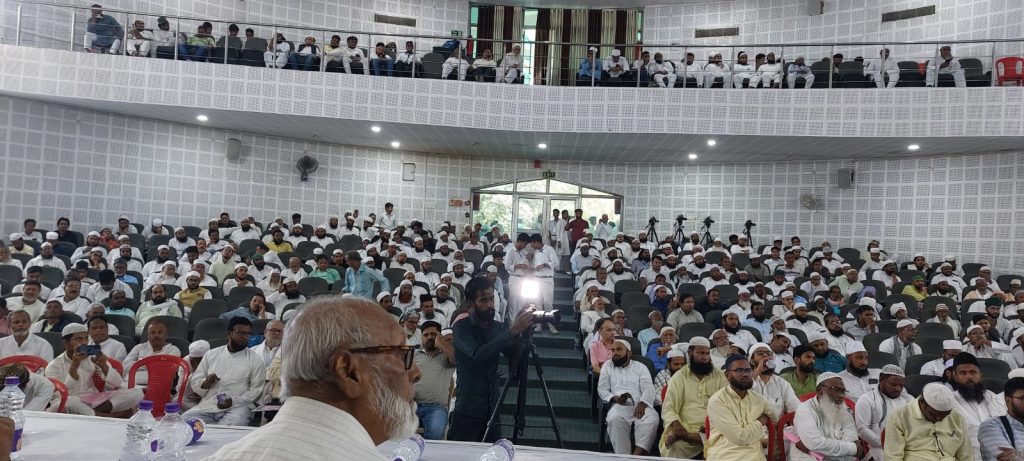Imarat e Shariat Removes Ahmad Wali Faisal Rahmani, Appoints Maulana Anisur Rahman Qasmi as New Amir-e-Shariat
Published: May 22, 2025 | Location: Patna, Bihar
Board of Trustees and Majlis-e-Arbab-e-Hal-o-Aqd Confirm Leadership Change, Citing Violations of Trust Deed and Shariah Principles
“امارت شرعیہ کا دشمن، غدارِ امت، بددیانت و فاسد، غیر ملکی شہریت رکھنے والا، دین سے بیزار، گمراہ کن عقائد کا حامل، شرعی اصولوں کی توہین کرنے والا فیصل رحمانی عہدے سے معزول!”
“भ्रष्ट, अयोग्य और गैर-इस्लामी! विदेशी नागरिकता, भ्रष्टाचार और गुमराह करने वाली सोच, धर्म से विमुख, कोई आलिम नहीं, सिर्फ एक भ्रष्ट राजनीतिज्ञ, शरीयत का मजाक उड़ाने वाले फैसल रहमानी को शरीयत इमारत से हटाया गया”
PATNA – In a decisive move, the Imarat e Shariat of Bihar, Odisha, and Jharkhand announced the removal of Ahmad Wali Faisal Rahmani as its Amir-e-Shariat during a crucial meeting of the Majlis-e-Arbab-e-Hal-o-Aqd (Council of Decision-Makers) on Thursday, May 22, 2025. The council, comprising over 600 members, unanimously endorsed the Board of Trustees’ March 20 decision to dismiss Rahmani, citing his foreign citizenship, lack of Islamic scholarly credentials, alleged promotion of “misguided beliefs,” and violations of the Emirate’s constitution. Maulana Anisur Rahman Qasmi was formally elected as the new Amir-e-Shariat, with the council pledging allegiance (bay’ah) to him.
Key Decisions and Rationale
1. Removal of Ahmad Wali Faisal Rahmani
The council accused Rahmani of:
-
Holding foreign citizenship, disqualifying him from leadership.
-
Not being a “credible, practicing Islamic scholar”—a prerequisite for the Amir-e-Shariat role.
-
Violating the Emirate’s Trust Deed and constitution.
-
Promoting “misguided ideologies” publicly.
Quote:
“The Imarat e Shariat’s purpose is to establish Islamic law (Nizam-e-Shari’ah). Its leader must be a deeply knowledgeable scholar well-versed in Shariah principles—a criteria Rahmani failed to meet,” stated the council’s resolution.
The Board of Trustees had earlier dismissed Rahmani on March 20, a decision now ratified by the Majlis. Rahmani was directed to vacate the Emirate’s properties, surrender documents, and cease using its official resources.

2. Appointment of New Amir-e-Shariat
Maulana Anisur Rahman Qasmi, a senior cleric, was unanimously endorsed as Rahmani’s successor. The council emphasized his scholarly credentials and adherence to the Emirate’s founding mission: “guiding Muslims toward a Shariah-compliant life.”
Quote from Maulana Anisur Rahman Qasmi:
“This Emirate is the legacy of our forefathers, built on sincerity and sacrifice. We will uphold its duty to unite the community under Quranic principles.”
Resolutions on Key Issues
1. Rejection of Waqf Amendment Act 2025
The council condemned the central government’s Waqf Amendment Act as “an open injustice” threatening Muslim endowments, demanding its immediate repeal.
Action Plan:
-
Collaborate with the All India Muslim Personal Law Board to launch protests.
-
Urge the Bihar government to oppose the law.
2. Education Reforms
Proposals included:
-
Mandatory morning/evening maktabs (Islamic schools) for children attending secular schools.
-
Modern education in an Islamic environment, with focus on science and law.
-
Demanding Bihar appoint a permanent chairman for the Madrasa Education Board.
3. Promotion of Urdu
-
Push for Urdu as a medium of instruction in schools and universities.
-
Demand Bihar allocate budgets for Urdu-language development.
4. Social Reforms
-
Combat dowry (jahez) and extravagant wedding customs.
-
Encourage scholars to lead societal reform movements.

Imarat e Shariat
Notable Attendees
The meeting was presided over by Maulana Nazeer Tauheed Mazahiri, with key addresses by:
-
Maulana Shibli Qasmi (Nazim, Imarat e Shariat)
-
Maulana Abu Zafar Hassan Nadwi (Mumbai)
-
Mufti Suhail Ahmad Qasmi (Head Mufti)
-
Senior Advocate Raghib Hasan
Conclusion
The Imarat e Shariat’s leadership transition underscores its commitment to “preserving Islamic jurisprudence” amid internal and external challenges. With Rahmani’s dismissal and Qasmi’s appointment, the organization aims to reassert its religious authority while addressing community concerns—from education to legal rights.
Final Quote:
“Unity under the banner of Tauheed (monotheism) is our strength. We must reject divisive forces and work for collective progress,” urged Maulana Anisur Rahman Qasmi in his closing address.
![]()











